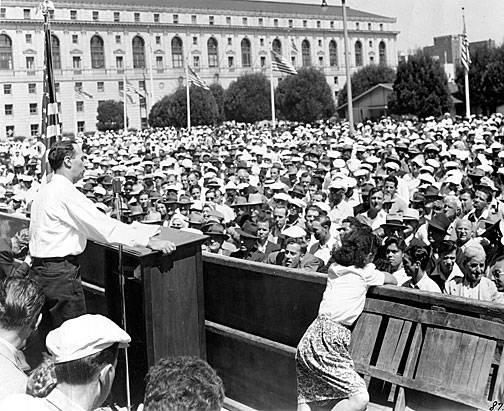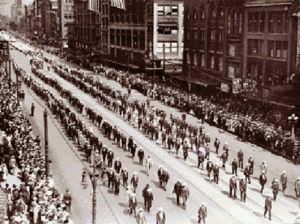Labor Day Celebration, 1947, San Francisco
Happy Labor Day. To me this holiday seems little more than a historical anachronism - organized labor is blamed for corruption and demanding higher wages and more benefits than employers can afford. Workers are no longer praised or honored for their achievements in being the foundation of the nation's success. We ship jobs to nations with lower worker pay, little or no regulation, and do little to help the workers, mostly blue color, who are out of work.
We are no longer a nation of factories and mills - we are technological society and these jobs either require no skills (data entry), resulting in low pay, or they require advanced education, resulting in higher pay. Organized labor got fair pay for factory workers and skilled craftsmen (construction, electricians, plumbers, etc) but unions have been effectively banned from the technology world.
First Labor Day parade, 1882, New York City
While I am a supporter of organized labor (my father was a union member), I am also aware that labor leaders frequently have been corrupt, and sometimes have been unwilling to adapt their demands to realities of the workplace. I would hope to see labor make a comeback in this country, but more and more conservative states are making union organizing nearly impossible (including Arizona, where I live).
In honor of the holiday, Good Magazine takes a look at organized labor in the United States - we've seen better days.
State of the Unions: Organized Labor Has Seen Much Better Days
- September 2, 2012
Lest we forget why we've got a three-day weekend, Labor Day is a recognition of American workers and what they've done for the country. Minyanville writes that the labor movement has seen significant decline in recent years, and checks in on a few specific labor unions. Here's an excerpt from the section on public sector workers:Last year the state of Wisconsin was ground zero for what many believe was the decline of American labor unions. The battle over collective bargaining between Wisconsin public sector workers and Governor Scott Walker that resulted in the passage of his anti-union “Wisconsin budget repair bill” last March didn’t just hit national headlines, it took the conversation of collective bargaining to the national stage and climaxed in the June 5 failed recall election of the governor.
The failed recall was seen by many as the beginning of the end for labor unions. On the same day, pension reforms for public sector workers were overwhelmingly favored in elections in San Jose and San Diego, supporting evidence from polls showing that public approval of unions was dropping. A 2009 Gallup poll found that only 48% of the public supported unions compared to 72% of Americans approving of unions in a 1936 Gallup poll.Earlier this week, Business Insider's Henry Blodget posted this timely column titled "Dear American Companies: Here's How To Fix The Economy:"In short, instead of viewing "shareholders" and "customers" as the only two corporate constituencies that matter, Ford introduced the idea that great companies should also serve a third constituency:
Employees.And because one company's employees are another company's customers, Ford's decision (to dramatically increase wages) helped spread the country's wealth to more citizens and expand the purchasing power of the country as a whole. And, in so doing, it helped the overall economy.So hey, while you're enjoying the weekend, remember that what you're celebrating is a major economic engine in the country, both past and present, and one that is facing quite a bit of tumult. Here's a brief primer on the history of Labor Day itself. Got any favorite labor-related reading? Share some recommendations in the comments—a few of us might celebrate by reading under a tree on Monday.Photo, "Glass Works. Midnight," via Library of Congress.



No comments:
Post a Comment